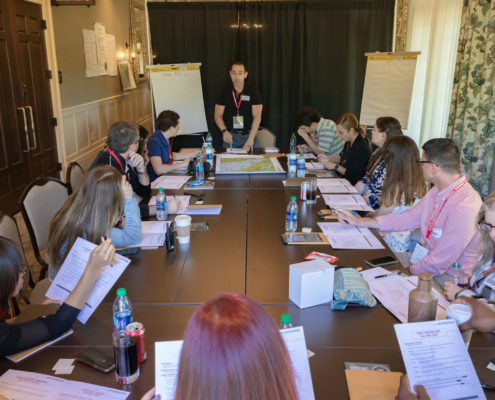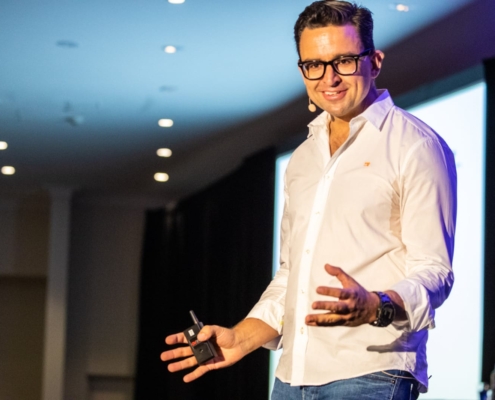 https://www.afterburner.com/wp-content/uploads/2024/10/Front-view-of-man-in-lanyard-and-business-casual-facilitating-event.jpg
1250
2000
Ansley Anchors
/wp-content/uploads/2024/07/Afterburner-Logo-Resize-Fullcolor-300x93.png
Ansley Anchors2025-01-14 11:03:292025-01-14 14:56:11Harnessing the Power of the Subconscious for Leadership Mastery
https://www.afterburner.com/wp-content/uploads/2024/10/Front-view-of-man-in-lanyard-and-business-casual-facilitating-event.jpg
1250
2000
Ansley Anchors
/wp-content/uploads/2024/07/Afterburner-Logo-Resize-Fullcolor-300x93.png
Ansley Anchors2025-01-14 11:03:292025-01-14 14:56:11Harnessing the Power of the Subconscious for Leadership Mastery
Do you often find yourself repeating the same mistakes without understanding why? Have you ever wondered why some individuals or teams excel at learning from failures while others seem stuck in a cycle of repeating them? In the dynamic landscape of personal and organizational development, Debriefing emerges as a powerful tool for learning from mistakes and failures and achieveing continuous improvement.
The Essence of Debriefing
Debriefing is not just a post-event discussion; it’s a deliberate and structured process aimed at extracting actionable insights from experiences, whether they are successes or failures. Drawing inspiration from the aviation industry’s black box concept, which records crucial data for analysis after accidents, debriefing provides a similar opportunity for reflection and analysis in various contexts, from military operations to corporate endeavors.
At the heart of strategic debriefing lies a systematic approach to unpacking the intricacies of each experience. The ORCA Debriefing Method℠ offers a clear framework:
Objectives: Begin by revisiting the original objectives or goals of the mission. Did you achieve what you set out to accomplish? Understanding the intended outcomes provides a crucial reference point for evaluating performance.
Results: Next, assess the results or outcomes of the mission. What worked well, and what fell short of expectations? Objective analysis of outcomes lays the foundation for identifying areas of improvement.
Causes: Delve into the underlying causes behind both successes and failures. What factors contributed to the outcomes observed? By examining root causes, you can uncover patterns and trends that influence performance.
Actions: Based on the insights gained, develop actionable steps for improvement. How can you capitalize on successes and address shortcomings? Implementing concrete actions derived from debriefing ensures continuous growth and development.
A Growth Mindset for Continuous Improvement
Central to the effectiveness of strategic debriefing is cultivating a growth mindset—a belief in the capacity for improvement through effort and learning. Unlike a fixed mindset that views intelligence and abilities as static, a growth mindset sees setbacks as opportunities for growth and the key to continuous improvement.
Neuroscience research highlights the brain’s response to failure, revealing distinct patterns of activity in individuals with growth mindsets. By paying attention to failure signals and embracing constructive criticism, individuals and teams with a growth mindset leverage debriefing as a catalyst for learning and innovation.
Strategic debriefing isn’t just about personal reflection—it’s about how whole organizations learn. By making it easy to spot mistakes, companies create a vibe of always getting better. When failure is seen as a chance to learn, teams feel free to try new things and adapt quickly, which are key to success in today’s fast-paced world.
From Setbacks to Success
In a world where success often emerges from the ashes of failure, debriefing serves as a beacon of opportunity for continuous improvement. By adopting a structured approach to reflection and learning, individuals and organizations can unlock the hidden potential within mistakes and failures. From the boardroom to the battlefield, the power of debriefing transforms setbacks into stepping stones toward success. Embrace strategic debriefing as your roadmap to continuous growth, innovation, and excellence.
Break free from the cycle of repeating mistakes! Contact us today to revolutionize your approach to learning and growth through Debriefing.
Share This Post
More Like This
 https://www.afterburner.com/wp-content/uploads/2024/10/Front-view-of-man-in-lanyard-and-business-casual-facilitating-event.jpg
1250
2000
Ansley Anchors
/wp-content/uploads/2024/07/Afterburner-Logo-Resize-Fullcolor-300x93.png
Ansley Anchors2025-01-14 11:03:292025-01-14 14:56:11Harnessing the Power of the Subconscious for Leadership Mastery
https://www.afterburner.com/wp-content/uploads/2024/10/Front-view-of-man-in-lanyard-and-business-casual-facilitating-event.jpg
1250
2000
Ansley Anchors
/wp-content/uploads/2024/07/Afterburner-Logo-Resize-Fullcolor-300x93.png
Ansley Anchors2025-01-14 11:03:292025-01-14 14:56:11Harnessing the Power of the Subconscious for Leadership Mastery https://www.afterburner.com/wp-content/uploads/2024/09/Christian-_Boo_-Boucousis-on-stage-1.jpeg
1066
1600
Nate Riggins
/wp-content/uploads/2024/07/Afterburner-Logo-Resize-Fullcolor-300x93.png
Nate Riggins2024-12-19 14:08:102025-01-14 14:56:11How to Pick the Right Guest Speaker for Your Event
https://www.afterburner.com/wp-content/uploads/2024/09/Christian-_Boo_-Boucousis-on-stage-1.jpeg
1066
1600
Nate Riggins
/wp-content/uploads/2024/07/Afterburner-Logo-Resize-Fullcolor-300x93.png
Nate Riggins2024-12-19 14:08:102025-01-14 14:56:11How to Pick the Right Guest Speaker for Your Event https://www.afterburner.com/wp-content/uploads/2024/10/2462040_PhotoshopImagesBlackFlightSuits_03_091524.png
2369
3553
Ansley Anchors
/wp-content/uploads/2024/07/Afterburner-Logo-Resize-Fullcolor-300x93.png
Ansley Anchors2024-10-31 08:56:592025-01-14 14:56:12Afterburner Black
https://www.afterburner.com/wp-content/uploads/2024/10/2462040_PhotoshopImagesBlackFlightSuits_03_091524.png
2369
3553
Ansley Anchors
/wp-content/uploads/2024/07/Afterburner-Logo-Resize-Fullcolor-300x93.png
Ansley Anchors2024-10-31 08:56:592025-01-14 14:56:12Afterburner Black https://www.afterburner.com/wp-content/uploads/2024/09/collaboration-1400-1.jpeg
933
1400
Nate Riggins
/wp-content/uploads/2024/07/Afterburner-Logo-Resize-Fullcolor-300x93.png
Nate Riggins2024-10-11 18:00:002025-01-14 14:56:12Mission Critical: Why Every Team Needs Debriefing
https://www.afterburner.com/wp-content/uploads/2024/09/collaboration-1400-1.jpeg
933
1400
Nate Riggins
/wp-content/uploads/2024/07/Afterburner-Logo-Resize-Fullcolor-300x93.png
Nate Riggins2024-10-11 18:00:002025-01-14 14:56:12Mission Critical: Why Every Team Needs Debriefing https://www.afterburner.com/wp-content/uploads/2024/09/Audience-reaction-2.jpeg
1365
2048
Nate Riggins
/wp-content/uploads/2024/07/Afterburner-Logo-Resize-Fullcolor-300x93.png
Nate Riggins2024-02-09 17:02:342025-01-14 14:56:12Four Key Items to Include in Your Next Corporate Event
https://www.afterburner.com/wp-content/uploads/2024/09/Audience-reaction-2.jpeg
1365
2048
Nate Riggins
/wp-content/uploads/2024/07/Afterburner-Logo-Resize-Fullcolor-300x93.png
Nate Riggins2024-02-09 17:02:342025-01-14 14:56:12Four Key Items to Include in Your Next Corporate Event https://www.afterburner.com/wp-content/uploads/2024/09/embracing-failure-afterburner-1-scaled-1.jpg
1920
2560
Nate Riggins
/wp-content/uploads/2024/07/Afterburner-Logo-Resize-Fullcolor-300x93.png
Nate Riggins2024-01-09 22:52:542025-01-14 14:56:13Reimagining Your Sales Kickoff: Infusing Innovation and Connection
https://www.afterburner.com/wp-content/uploads/2024/09/embracing-failure-afterburner-1-scaled-1.jpg
1920
2560
Nate Riggins
/wp-content/uploads/2024/07/Afterburner-Logo-Resize-Fullcolor-300x93.png
Nate Riggins2024-01-09 22:52:542025-01-14 14:56:13Reimagining Your Sales Kickoff: Infusing Innovation and Connection https://www.afterburner.com/wp-content/uploads/2024/09/the-execution-gap-afterburner.jpg
1080
1920
Nate Riggins
/wp-content/uploads/2024/07/Afterburner-Logo-Resize-Fullcolor-300x93.png
Nate Riggins2024-01-08 16:24:542025-01-14 14:56:13Closing the Execution Gap: Transforming Meetings and Strategies
https://www.afterburner.com/wp-content/uploads/2024/09/the-execution-gap-afterburner.jpg
1080
1920
Nate Riggins
/wp-content/uploads/2024/07/Afterburner-Logo-Resize-Fullcolor-300x93.png
Nate Riggins2024-01-08 16:24:542025-01-14 14:56:13Closing the Execution Gap: Transforming Meetings and Strategies https://www.afterburner.com/wp-content/uploads/2024/09/Group_Meeting_2-1.jpeg
1707
2560
Nate Riggins
/wp-content/uploads/2024/07/Afterburner-Logo-Resize-Fullcolor-300x93.png
Nate Riggins2024-01-02 18:26:092025-01-14 14:56:14Fueling Business Agility: The Strategic Pivot
https://www.afterburner.com/wp-content/uploads/2024/09/Group_Meeting_2-1.jpeg
1707
2560
Nate Riggins
/wp-content/uploads/2024/07/Afterburner-Logo-Resize-Fullcolor-300x93.png
Nate Riggins2024-01-02 18:26:092025-01-14 14:56:14Fueling Business Agility: The Strategic Pivot https://www.afterburner.com/wp-content/uploads/2024/09/fortune-cookies-1400x933-1.jpeg
933
1400
Nate Riggins
/wp-content/uploads/2024/07/Afterburner-Logo-Resize-Fullcolor-300x93.png
Nate Riggins2024-01-02 18:24:072025-01-14 14:56:14Want to make better business predictions? Flawless Execution is the answer.
https://www.afterburner.com/wp-content/uploads/2024/09/fortune-cookies-1400x933-1.jpeg
933
1400
Nate Riggins
/wp-content/uploads/2024/07/Afterburner-Logo-Resize-Fullcolor-300x93.png
Nate Riggins2024-01-02 18:24:072025-01-14 14:56:14Want to make better business predictions? Flawless Execution is the answer.About Us
Building Strong Teams Through the Guidance of Fighter Pilot Keynote Speakers.

